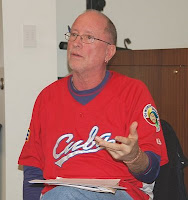Posted on November
13, 2017
Abridge Suspension
USA-haters have special status
by
Daniel
Clark
During Game 3 of the World Series, Houston Astros
first baseman Yuli Gurriel
mocked Los Angeles Dodgers pitcher Yu Darvish, who is from Japan, by lifting the
corners of his eyes with his fingers.
For this, he was roundly condemned by the sports media, and suspended
for the first five games of the 2018 season.
Major League Baseball Commissioner Rob Manfred unambiguously explained,
“There is no excuse or explanation that makes that type of behavior
acceptable.”
 But
wait a minute. Hadn’t we all agreed that
professional athletes have a right to express themselves, and that nobody can
tell them what to do? Oh, but those
rules only apply to anti-American expression.
Anti-Japanese expression, or any expression that liberals don’t like,
remains forbidden. There is no
principle, legal or otherwise, that requires us to tolerate football players’
demonstrations against our flag and our national anthem. There’s just how liberals feel about it.
But
wait a minute. Hadn’t we all agreed that
professional athletes have a right to express themselves, and that nobody can
tell them what to do? Oh, but those
rules only apply to anti-American expression.
Anti-Japanese expression, or any expression that liberals don’t like,
remains forbidden. There is no
principle, legal or otherwise, that requires us to tolerate football players’
demonstrations against our flag and our national anthem. There’s just how liberals feel about it.
At an NFL game early this season in London, three
Miami Dolphins knelt during The
Star-Spangled Banner, but everyone stood for God Save the Queen. What if
it had been the other way around? Better
yet, let’s take a nation with the kind of tyrannical government liberals
love. What if, during the next World
Baseball Classic, the players for Team USA refused to stand for the national
anthem of Cuba, or Venezuela? Would the
media regard those players’ freedom of expression to be sacrosanct?
Defenders of the NFL anthem protesters like to cite
the First Amendment, the relevant part of which reads, “Congress shall make no
law … abridging the freedom of speech.”
Nothing in that says that a professional athlete has the right to protest
against America while representing his team, on the field and in uniform. So where do people get the idea that
demonstrations against the United States enjoy a unique legal protection that
other forms of expression don’t? From
the Supreme Court, sadly enough.
In the 1989 Texas
v. Johnson flag-burning case, the Court ruled 5-4 that a member of the
Revolutionary Communist Youth Brigade was within his First Amendment rights to
steal an American flag from a public display and set it on fire outside the 1984
Republican Convention. This, despite the
fact that the law in question was a state law, and not one made by the federal
legislature, which is what the Constitution means by “Congress.” This case is one of the many applications of
the Court’s wholly fabricated concept of “incorporation,” by which it extends
constitutional restrictions to the state and local levels, even though the
Constitution clearly spells out that they apply to federal powers only. Thereby, the definition of “Congress” in the
First Amendment is expanded to include state governments, city hall, and even
your local schoolboard. Never mind that
the men who wrote and ratified the Constitution meant the exact opposite, in
clearly distinguishing which provisions curtailed government power at all
levels (“No person shall … be compelled in any criminal case to be a witness
against himself …”), and those that restrained the federal government only
(Congress shall make no law …”).
 Moreover,
burning stuff can in no way be considered “speech.” Naturally, the Court circumvented this
obstacle by redefining “speech” as “expressive conduct,” a phrase that can
encompass virtually any action. Some
people express themselves through violence.
Did the justices mean to say that should be tolerated? Probably not, but by drawing its
redefinitions as broadly as possible, it assigned itself the power to
arbitrarily determine what expressions are allowed on a case-by-case basis.
Moreover,
burning stuff can in no way be considered “speech.” Naturally, the Court circumvented this
obstacle by redefining “speech” as “expressive conduct,” a phrase that can
encompass virtually any action. Some
people express themselves through violence.
Did the justices mean to say that should be tolerated? Probably not, but by drawing its
redefinitions as broadly as possible, it assigned itself the power to
arbitrarily determine what expressions are allowed on a case-by-case basis.
Today, nobody even questions whether burning an
American flag in a public square is protected by the First Amendment, but what
about publicly setting fire to a Mexican flag, or a rainbow banner? In those cases, the Court would undoubtedly
reference its equally capricious “fighting words” doctrine from the 1942 Chaplinsky v. New Hampshire case. With no constitutional support whatsoever,
the justices outlawed words that “by their utterance inflict injury or tend to
incite an immediate breach of the peace.”
Inflict injury? By
utterance? Why not just prohibit
“micro-aggressions” while they were at it?
In the judiciary, just as in the sports media, the
NFL, or anywhere else that liberals rule, they appoint themselves as arbiters
of what speech or expression is protected and which is condemned. That’s because it is their feelings, and
theirs alone, that matter. Anti-American
utterances inflict no injury on liberals, but say anything they find injurious
– like “midget” or “waitress” or “illegal alien” – and them’s
fighting words!
The Shinbone: The
Frontier of the Free Press